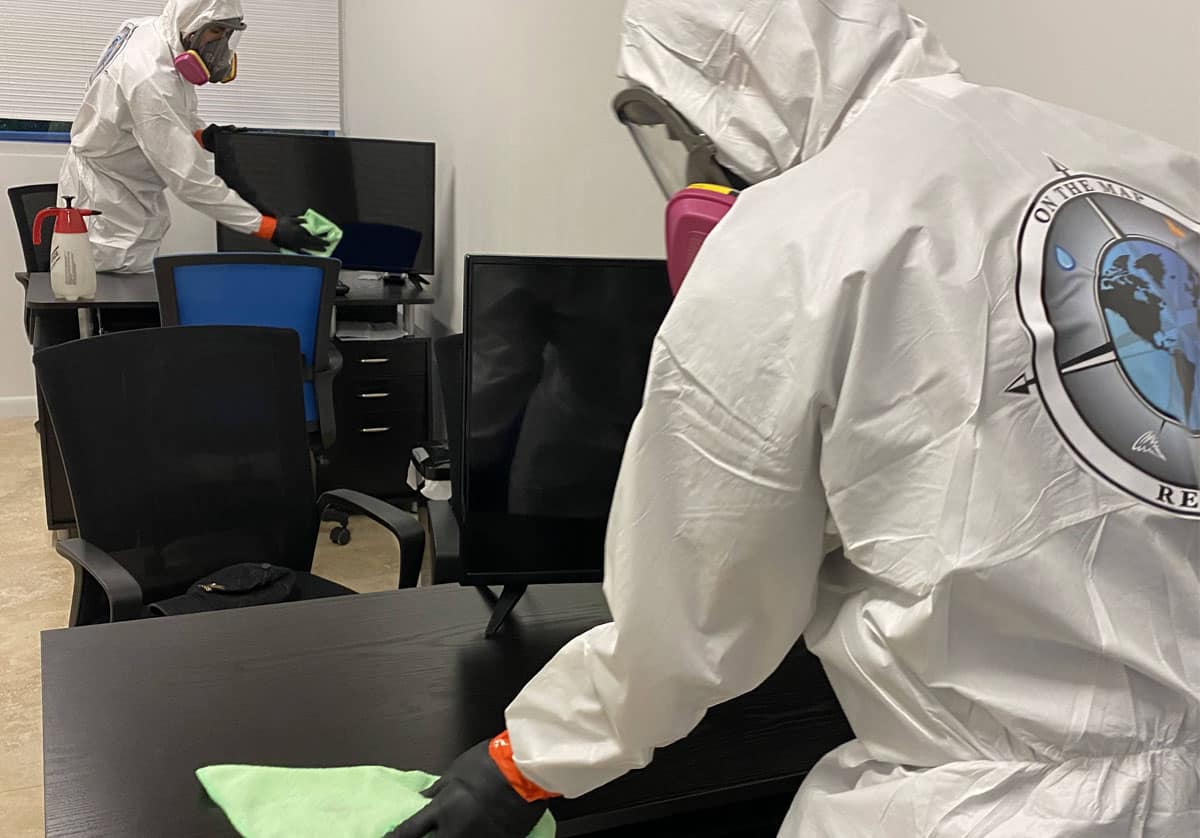Indoor air pollution is a severe problem with health and financial implications for homeowners nationwide. The average person spends over 90% of their time indoors, which means poor indoor air quality can considerably threaten your health. Indoor mold growths, in particular, have been linked to severe respiratory problems, including asthma attacks, allergies, and other illnesses like Legionnaire’s Disease, which can be deadly if left unchecked by a professional cleaning service or industrial-strength solution. It’s reported nearly 600,000 Kids Under 5 Die From Air Pollution each year. OTM Restoration can help remove mold and improve indoor air quality.
Air Pollution Threatens People Worldwide
Air pollution is the single greatest threat to human health. The World Health Organization (WHO) estimates a total of 7 million deaths tied to air pollution. 4.2 million die prematurely yearly from outdoor air pollution, and 3.8 million die from indoor air pollution. It includes almost 600,000 children under five who die from illnesses caused by air pollution each year.
Air pollution is a global problem that requires global solutions. It can harm everyone, but children are particularly vulnerable because they breathe faster than adults, and their bodies are still growing. Sources include transportation, energy production, and industrial facilities such as factories or foundries.
Indoor Air Pollution Much Worse Than Outdoor Air Pollution
Indoor air pollution can be five times worse than outdoor air pollution. Causes include dust mites, mold, pet dander, and other allergens that come into your home when you bring in outside contaminants. These pollutants are concentrated in homes because they don’t have the same ventilation systems and filters that outdoor spaces do. It means you’re inhaling these contaminants at a higher rate than if you were outside enjoying the fresh air.
Indoor air pollution can lead to respiratory problems like asthma or allergies for those susceptible to them. Indoor air quality (IAQ) affects people with preexisting health conditions more than healthy individuals—but everyone should improve IAQ because it’s essential for everyone’s well-being!
Time Spent Indoors
The average person spends over 90% of their time indoors. For many, that means inside an office building or a home full of toxic chemicals. It can harm your health, mainly if you live in an area with high pollution.
To keep yourself safe from the dangers of air pollution, always wear a mask when you go outside and avoid areas with heavy traffic and factories.
Every year, Nearly 600,000 kids Die from Air Pollution
The World Health Organization (WHO) estimates that air pollution is the greatest threat to human health. Almost 600,000 kids under five die from illnesses caused by air pollution each year.
Air pollution can be as much as five times worse than outdoor mold exposure when it comes to causing lung damage and respiratory issues for children. Indoor air quality can be up to five times worse than outdoor air quality because of the materials used in modern buildings. Combined with poor ventilation and heating systems that trap contaminants in your home, you can see how important it is to maintain a healthy house!
If you’re concerned about your child’s health and want to ensure they breathe clean air all day, consider installing an ionizer or HEPA filter. A unit in their bedroom ensures they get every chance to grow into an adult with no lung problems later in life.
Twenty-Two Million Americans Diagnosed with Asthma
Asthma is a severe respiratory disease that affects the airways. It can trigger by air pollution and other irritants, such as mold or mildew growths, dust mites, cockroaches, smoke from cigarettes or fires, animal dander (like cat fur), and even some household cleaners. If you have asthma and have exposure to these triggers at home or work—or if you live in a city with heavy traffic—you should take precautions.
If you have asthma:
- Use an air conditioner with a HEPA filter when possible.
- Avoid smoking in your home. If you smoke outside your home (in places like parks), ensure there isn’t any ashtray nearby that could blow into your house through open windows/doors during breezy days.
- Keep pets away from bedrooms whenever possible; this will help prevent allergic reactions when people sleep most deeply at night.
 Air Quality | Nearly 600,000 Kids Under 5 Die From Air Pollution. High-Efficiency Particulate Air. HEPA and Charcoal Activated Carbon Air Quality Filters Close Up. Commercial and Residential Modern Air Filtration Systems.
Air Quality | Nearly 600,000 Kids Under 5 Die From Air Pollution. High-Efficiency Particulate Air. HEPA and Charcoal Activated Carbon Air Quality Filters Close Up. Commercial and Residential Modern Air Filtration Systems.
The WHO estimates that over 1 billion people worldwide become exposed to indoor mold and mildew growths, with 30% of houses worldwide being affected by mold growth.
Mold spores are everywhere. It can be detected in the air and on every home surface. The fact that they are so common makes it especially important to reduce mold growth in your home since even small amounts can cause health problems if inhaled or ingested regularly over time.
Mold grows best in damp areas with little or no sunlight and lots of moisture, such as under sinks or furniture near windows facing north or east sides of buildings (the shady sides). Older homes may have leaks from water damage that allow mold to grow unchecked for years after construction. It’s why it’s essential to inspect the interior and exterior walls for signs of wear before making any repairs – especially if you know there’s been a leak recently!
One in Four United States Homes have Unsafe Levels of Mold
The Environmental Protection Agency (EPA) estimates that one in four United States homes has unsafe mold or dampness. Mold can cause severe allergic reactions and respiratory diseases and damage homes and other buildings if left unchecked by a professional cleaning service.
In 2009, there were 4.8 million emergency room visits due to asthma attacks, often resulting from poor indoor air quality conditions like mold spores or mildew growths.
Mold is one of the most common indoor air pollutants. Molds are microscopic fungi that grow in moist areas, such as damp basements or bathrooms. They are prevalent in water-damaged buildings and homes with poor ventilation and ventilation. To get an idea about how serious this problem can be, consider this: A study published by Johns Hopkins School of Public Health found that more than 45 percent of participants reported some reaction when exposed to mold spores.
Mold can cause severe allergic reactions and respiratory diseases like asthma attacks or bronchitis, so it’s essential to avoid exposure if possible. Exposure can happen through touching moldy objects or breathing them in a while cleaning out a damp area that has been affected by water damage or flooding (like during hurricanes). If your home flooded recently, contact a professional mold removal service right away so they can remove any contaminated materials before they become airborne again!
If left unchecked, mold growth will damage your building structure beyond repair. And if you live there too long without fixing these problems firsthand, you could also get sick from living in those conditions too long without proper maintenance practices.
Over 100 Toxic Molds Identified Worldwide
Toxic molds are everywhere and can grow on many different types of materials. There are over 100 different kinds of toxic molds that researchers across the world have identified. Household toxic molds usually grow in damp areas, such as basements or bathrooms, where moisture is present for long periods. However, toxic molds can also grow in your kitchen if you don’t clean out your fridge often enough or leave wet clothes lying around for too long.
Toxic molds produce mycotoxins (poisonous chemicals) which get released into the air when they grow, making it easy for you to inhale them without realizing it!
Mold and Allergic Reactions
Mold can cause severe allergic reactions, respiratory diseases, and damage to homes and other buildings if left unchecked by a professional cleaning service or industrial-strength solution.
Mold is a severe health hazard that can cause allergic reactions and respiratory diseases. In addition to the damage it can do to homes, mold threatens building integrity if left unchecked by a professional cleaning service or industrial-strength solution.
The Cost of Poor Indoor Air Quality
Poor indoor air quality can be a severe problem with natural health and financial implications for homeowners nationwide. However, as modern homes get built to be more energy efficient, indoor air quality is becoming increasingly crucial to maintaining good health in these environmentally controlled environments.
Research shows that poor indoor air quality can cause serious health problems, including respiratory illnesses such as asthma or allergies. It may also lead to an increased risk for chronic diseases like cancer due to long-term exposure (even without severe reactions). And don’t forget about mold! Mold spores can cause allergic reactions and respiratory infections like pneumonia or bronchitis when inhaled consistently over time – not fun!
 Air Quality | Nearly 600,000 Kids Under 5 Die From Air Pollution. OTM Restoration team cleaning areas of mold and improving indoor air quality.
Air Quality | Nearly 600,000 Kids Under 5 Die From Air Pollution. OTM Restoration team cleaning areas of mold and improving indoor air quality.
OTM Restoration Can Improve Your Indoor Air Quality and Mold Problem
The poor indoor air quality in our homes and buildings seriously threatens human health and well-being. It is especially true for children, who are particularly vulnerable to the adverse effects of mold and mildew growth. It’s up to all of us as consumers to ensure that our homes are safe from these toxic molds by taking proactive steps like regularly cleaning out clutter or using dehumidifiers where necessary so we can breathe easy wherever we go!
Our well-trained technicians will clean the affected area, carefully and appropriately remove biohazardous materials, and thoroughly decontaminate the space. Believing that professionals are not only necessary but also reassuring, your property will be appropriately restored to its pre-traumatic state. OTM Restoration experts are on call and are available 24/7 to provide the sensitivity and professionalism required to handle residential and commercial trauma scene cleaning.
For a free consultation and quote, contact us at 800-416-5986 today!


Recent Comments